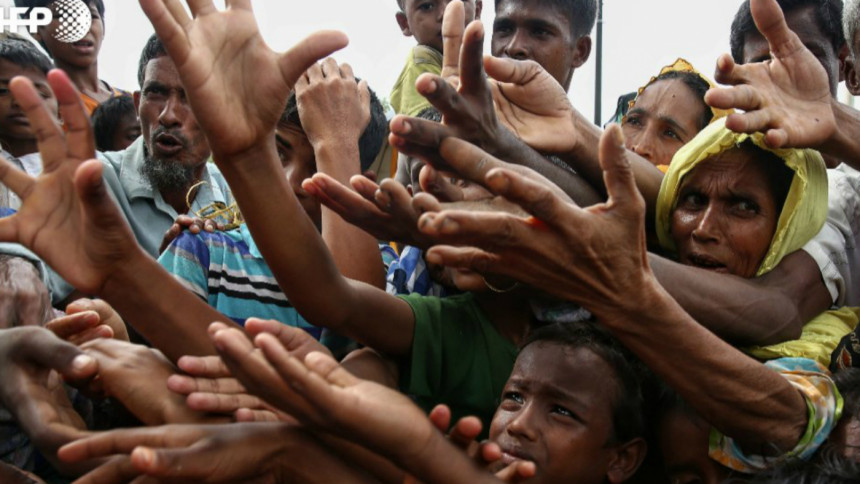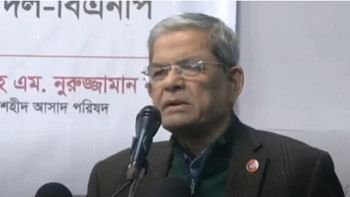Food aid suspended as Myanmar state sinks deeper into violence

The World Food Programme has suspended food aid in Myanmar's violence-scorched Rakhine state, as the humanitarian situation deteriorates with a surging death toll and tens of thousands -- both Rohingya Muslims and ethnic Buddhists -- on the move.
The UN's refugee agency late Saturday said some 60,000 mostly Rohingya Muslim refugees had poured into Bangladesh since the latest round of fighting broke out eight days ago, with the numbers expected to rise as thousands remain stuck on the border.
Relief agencies, including WFP, have repeatedly been accused by Myanmar authorities of allowing their rations to fall into the hands of Rohingya militants, whose attacks on police posts on August 25 sparked the most recent surge in violence.
Around 120,000 people -- most of them Rohingya Muslim civilians -- have relied on aid hand-outs in camps since 2012, when religious riots killed scores and sparked a crisis which is again burning through Rakhine state.
Over the last five years Rakhine has been cut along ethnic and religious lines, but the current violence is the worst yet.
Aid agencies are routinely accused of a pro-Rohingya bias and the sudden flare-up of unrest has renewed safety concerns, prompting relief work to be pulled back.
"All WFP food assistance operations in Rakhine State have been suspended due to insecurity... affecting 250,000 internally displaced and other most vulnerable populations," the WFP said in a statement.
The Rohingya, branded illegal immigrants in Myanmar and mostly denied citizenship, make up the vast majority of the dead and displaced since 2012.
In the ongoing bout of violence, 58,600 Rohingya have fled to Bangladesh, according to the latest figures from UNHCR.
Tens of thousands have been turned away by Bangladeshi border officials, while scores have died trying to cross the Naf river -- which divides the two countries -- in makeshift boats and even on flotsam.
Dead left unburied
Anwar, a Rohingya man, was one of those stranded on the Myanmar side of the border on Saturday evening, terrified soldiers would find them.
"I saw three or four people who died along the way, there was no one to bury them," he told AFP by phone, asking not to disclose his location or full name.
He said it had taken him, his wife and their seven children three days to walk to the border and that they were hoping the darkness could provide them enough cover to slip into Bangladesh as night fell.
He also expressed anger at Rohingya militants who launched last week's attacks, sparking a renewed Myanmar military crackdown and his family's desperate flight.
"We do not know them (the militants)," he said, adding: "We didn't do anything."
On Friday, Myanmar's army chief said nearly 400 people have died in the violence, among them 370 Rohingya militants, while 11,000 ethnic Rakhine Buddhists, Hindus and other minority groups have been internally displaced.
Myanmar authorities have rejected help offered by foreign aid groups for the displaced ethnic Rakhine, according to a statement by the European Commission's relief assistance department.
As army clearance operations continue, ECHO (European Civil Protection and Humanitarian Aid Operations) said access to northern Rakhine remained "cut off".
Meanwhile an "anti-UN/NGO propaganda campaign on Myanmar social media continues", the statement added.
'Humanitarian catastrophe'
Accounts from Rohingya refugees in Bangladesh and Buddhists who fled to Sittwe, the Rakhine state capital, indicate the death toll may be much higher.
The worst-hit areas are off-limits to reporters. But unverifiable testimony has trickled out, telling of tit-for-tat mass killings and villages being torched by the army and the militants.
Pierre Peron, spokesman for the UN Office for the Coordination of Humanitarian Affairs, warned disruption to aid supplies was having "a very real human impact".
UN Secretary General Antonio Guterres on Friday warned the spiral of violence could lead to a "humanitarian catastrophe" and urged Myanmar's government to provide security for aid agencies to reach those in need.
Shortly before his comments, aid groups were again spotlighted by army chief Min Aung Hlaing, whose office said WFP-labelled food and medicines had been found with dead militants.
The office of de facto civilian leader Aung San Suu Kyi has also put out multiple statements in the last week saying the same.
The militants are fighting under the banner of the Arakan Rohingya Salvation Army (ARSA), who say they are defending the ethnic minority from persecution by Myanmar.
Despite decades of persecution the Rohingya largely eschewed violence.
But the ARSA emerged as a force in October last year when their attacks killed Myanmar border police, prompting a crackdown by security forces which the UN says may have amounted to ethnic cleansing.


 For all latest news, follow The Daily Star's Google News channel.
For all latest news, follow The Daily Star's Google News channel. 








Comments